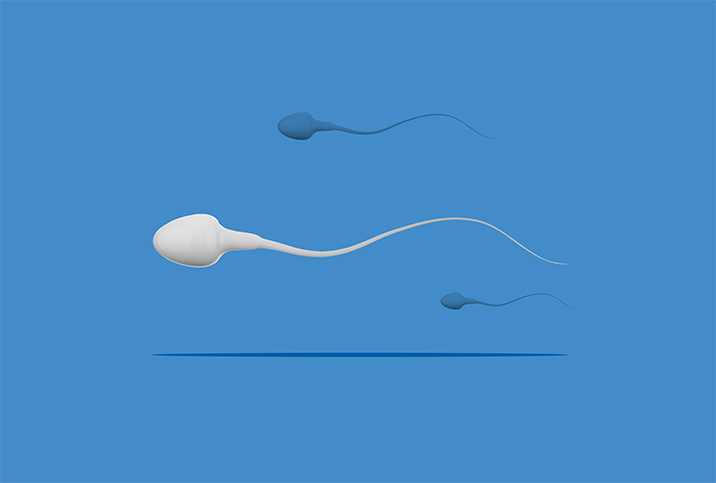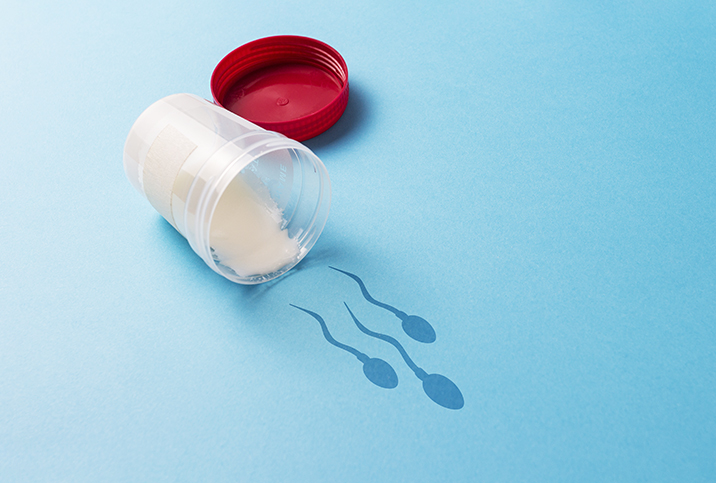Do Men Ever Stop Producing Sperm?

Robert De Niro recently revealed he had welcomed a new baby into his family. De Niro is 79 years old. While older men having children is nothing new, it does beg the question: Do men stop producing sperm? What about healthy sperm? Do they have endless reproductive capabilities with the right partner?
Women have an expiration date on their reproductive abilities with menopause, but the male fertility system functions differently.
Do men stop producing sperm?
In short, men never stop producing sperm.
"Spermatogenesis [the process of sperm production] continues throughout the lifetime of a male," said Ferdinand Obi, M.B.B.S., an OB-GYN and family physician in Nigeria.
Beginning sometime between the ages of 9 and 14, sperm production begins. After that, males can—and do—continue to produce sperm until they die. A healthy male can produce anywhere from 12 trillion to 16 trillion sperm over the course of an average lifetime, according to Obi.
To give you some perspective on how much sperm that actually is, the average male produces approximately 200 million sperm per ejaculation, with each ejaculate containing around 300 million to 500 million sperm cells in total, said Ketan Parmar, M.B.B.S, M.D., a psychiatrist, mental health expert and sexologist at ClinicSpots in Mumbai, India.
The actual process of sperm production takes about 74 days, during which each sperm cell transforms from an immature germ cell into a fully mature sperm cell. During that process, the sperm develop their tails and other features that allow them to move and angle for their place at a ready-to-be-fertilized egg.
Once sperm production is kicked off during puberty, it never stops. A fresh supply is made daily in the testes. Once they are fully mature, sperm can hang out in the epididymis, a structure on the back of each testicle near the top, for around two weeks.
Sperm that aren't released through ejaculation are broken down and reabsorbed by the body.
Does sperm health decline with age?
Aging itself does not stop or even slow down sperm production, Parmar said. Sperm production will continue full-speed ahead for a healthy male, no matter how old he is.
However, the aging process will have an impact on sperm in other ways.
For starters, Parmar noted that the decreased hormone levels associated with the aging process will reduce overall sperm count, meaning fewer sperm are produced. Sperm quality can also decline as males age.
What, exactly, does that mean?
As men get older, their sperm cells tend to become less motile, which is to say they move slower and become less active, according to Parmar. The morphology of sperm cells also changes in older males. They have higher rates of misshapen sperm.
The older a male gets, it's more likely his sperm have been impacted by DNA damage from outside environmental factors. Sperm cells can be negatively affected by any or all of the following:
- Exposure to toxins such as lead and heavy metals
- Infections
- Tumors
- Radiation
- Medications
- Lifestyle habits such as smoking or heavy drinking
How might sperm damage affect children?
Any damage to sperm can potentially translate to offspring with health conditions.
There is some evidence of a link between older males and children with autism spectrum disorders. The link appears to be primarily associated with already at-risk families, however, so it's not entirely clear how much of a factor age-related sperm health is. It's more a correlation than causation.
However, a 2020 systematic review and meta-analysis concluded that older males and older sperm can lead to more incidences of children born with facial deformities, urogenital and heart disorders, and chromosomal disorders.
The skinny on sperm and aging
Here's the thing about sperm health and aging: There doesn't appear to be a one-size-fits-all timeline for when male sperm is rendered too old to be used. A lot depends on the man's overall health, lifestyle, medical condition and history, and genetics.
For instance, according to the Brazilian Journal of Assisted Reproduction (JBRA), doctors have been debating about how much these potential age-related sperm changes will have on a male's reproductive abilities.
It's certainly possible that a 70-year-old male with no health complications could have healthier sperm than a 20-year-old male with diabetes, cancer or other medical conditions.
"Generally speaking, fertility typically starts to decline around the age of 40, with a steep decline after the mid-50s," Parmar said. "However, some men may remain fertile into their 70s or even 80s if they take good care of themselves and practice healthy lifestyle habits."
The JBRA study concluded that the older a male gets, the higher the chance their sperm has something wrong with it that can affect fertility. The journal broke down the age-related changes to sperm as follows:
- Males over 50 years old had the most changes in sperm volume, concentration and DNA mutations.
- Males over 41 years old had lowered sperm concentration (less sperm present in ejaculate).
- Males over 31 years old had lowered sperm movement.
Even with relatively consistent age-related changes, there were also some variations. For instance, males who had fairly consistent sperm concentration as they aged also had more volume and movement issues. But if they had good volume, they had more movement and concentration abnormalities, and if their sperm movement was good, semen volume dropped as they aged.
Guess you can't win them all, fellas.
You can always visit a doctor for a semen analysis, Obi and Parmar said, to test the health of your sperm and, if needed, develop a plan to help maximize your chances of reproducing.
Lifestyle changes, such as exercising, quitting alcohol and any illicit drug and tobacco use, getting enough sleep, and managing stress can also help increase sperm production.


















